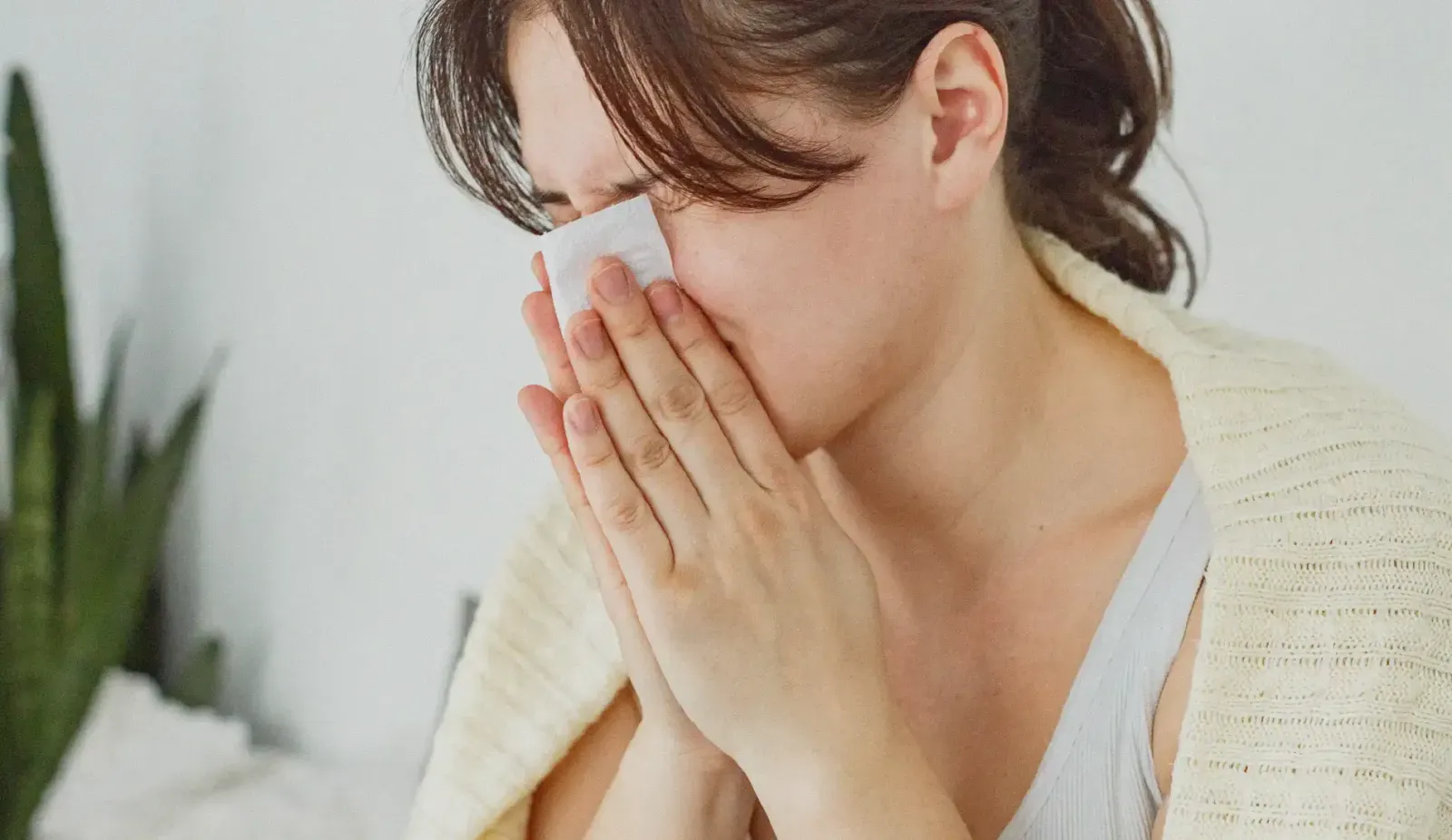Understanding the Causes of a Runny Nose
A runny nose, or rhinorrhea, can be due to benign causes (cold, allergies, irritants) or indicate a more serious problem (sinusitis, polyps, chronic rhinitis). Consult a doctor in case of persistent symptoms (> 10 days), purulent discharge, facial pain, or high fever. Finally, an ENT consultation may be necessary in cases of chronic rhinitis or anatomical abnormalities.
Several factors can cause rhinorrhea:
Viral infections
Rhinorrhea is most often caused by a cold (nasopharyngitis), a mild viral infection that usually resolves spontaneously within a few days. The virus causes inflammation of the nasal mucous membranes, increasing mucus secretion to trap pathogens.
Allergies
In allergic rhinitis, the immune system reacts to allergens (pollen, dust mites, pet dander) by releasing histamine, which causes a clear runny nose, sneezing, and itching. Symptoms persist as long as exposure to the allergen continues.
Irritations, medications, and other causes
A runny nose can also result from irritants (smoke, pollution, dry air) that can also cause a cough, from rhinitis medicamentosa (prolonged use of nasal decongestants, for example), or from functional disorders (vasomotor rhinitis), which cause excessive secretion. Hormonal changes (pregnancy, hypothyroidism) can also cause rhinorrhea.
To make a diagnosis, the doctor can carry out:
- ENT interview and examination to look for polyps and, deviated septum.
- Blood test (NFS, CRP) and allergy tests (prick tests) in case of suspected allergy.
- Sinus scan or nasal fiberscopy to explore structural causes.
What can I do to relieve a runny nose?
Nasal wash
Rinsing the nose with saline or seawater helps clear the nasal passages and reduce inflammation. It is recommended to do this several times a day, especially in case of colds or allergies.
Steam inhalations
Steam inhalations help decongest and loosen secretions. Lean over a bowl of hot water, cover your head with a towel, and breathe deeply for 5–10 minutes.
Hydration and rest
Drinking plenty of fluids (water, broths, herbal teas) keeps the mucous membranes hydrated and facilitates the elimination of mucus. Rest allows the immune system to fight infection more effectively.
Drugs
- Antihistamines: useful in cases of allergies, they reduce nasal secretions;
- decongestants: they temporarily relieve nasal congestion (a symptom of a cold), but their use should be limited to a few days to avoid a rebound effect;
- Pain relievers: In case of fever or associated pain, medications such as paracetamol can be taken.
Probiotics and Diet
An anti-inflammatory diet (fruits, vegetables, omega-3) and taking probiotics can strengthen immunity and rebalance nasal and intestinal flora.
How to prevent a runny nose?
Practical advice
- Hygiene: Wash your hands regularly to prevent the spread of viruses, and ventilate rooms daily to maintain healthy air.
- Avoid allergens and irritants: Identify and minimize exposure to allergy triggers by closing windows during pollen seasons and vacuuming regularly. Use air purifiers if necessary.
- hydration: drink enough water to keep mucous membranes hydrated;
- Humidify the air: Use a humidifier to prevent drying out of the nasal passages.
In children
It is advisable not to worry if your child has a runny nose. Even if it is yellowish, this does not mean there is a secondary infection: it is the natural progression of nasopharyngitis.
To relieve your child:
- Use disposable tissues, physiological serum, or solutions derived from seawater, in single-use doses;
- Do not use the nasal aspirator too often, as it can be irritating.
- wash the baby’s nose since he is too young to know how to blow his nose;
- Avoid using an air conditioner that dehumidifies the air and dries out your baby’s or child’s nasal mucous membranes.
When should you consult a professional?
Consult a doctor if:
- Symptoms last more than 10 days without improvement;
- The discharge becomes thick, purulent (yellow or green);
- appearance of facial pain , fever ≥ 38°C or respiratory discomfort ;
- Suspicion of severe allergy requiring assessment and specific treatment.
The opinion of MédecinDirect experts on runny noses:
A runny nose can be effectively relieved by a combination of nasal washes, inhalations, appropriate medications, and preventative measures. However, if symptoms persist or worsen, a medical consultation is essential to rule out any complications or underlying conditions.























+ There are no comments
Add yours